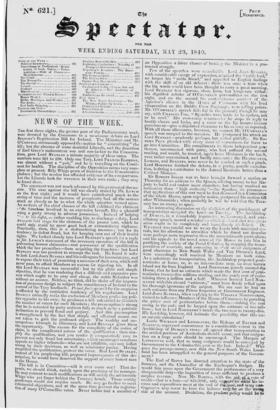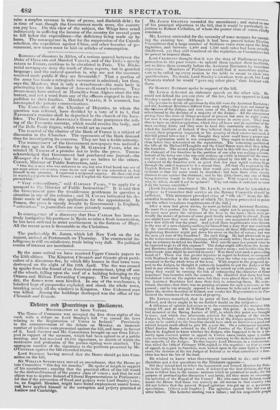NEWS OF THE WEEK.
THE first three nights, the greater part of the Parliamentary week, were devoted by the Commons to a wearisome debate on Lord STANLEY'S Registration Bill for Ireland. The Monsters and Mr. O'CONNELL strenuously opposed the motion for " committing" the bill; but the absence of some doubtful Liberals, and the desertion of Earl GREY'S malecontent son and son-in-law to the Conserva- tives, gave Lord STAN LEY a minute majority of three votes. The numbers were 301 to 298. Only one Tory, Lord FRANCIS EGERTON, was absent without a " pair," and he is travelling on the Conti- nent for health. The discipline of the Opposition seems very com- plete at present. Silly Whigs prate of disunion in the Conservative phalanx ; but the session has afforded evidence of its compactness. Let the Liberals look for waverers in their own ranks ; they may be found there.
The amiunent was not much advanced by this protracted discus- sion. The case against the bill was clearly stated by Mr. Llesen on the first night; and it would have contributed much to the saving of time and the increase of perspicuity had all the orators stuck as closely as he to what the whole question turned upon.
An Analysis of the chief clauses of the bill exhibited the claimant (4' thc franchise involved in an expensive lawsuit, like a plaintiff suing a party strong in adverse possession. Instead of helping te his right, or rather enabling him to discharge a duty, Lord bTANLOY laid traps for the clahnans of the poorer sort, which he
could only avoid by great good luck or extraordinary vigilance. Practically, then, this is it disfranchising measure ; not for its tendency to defeat fraud, but for keeping men out of their lawful
rights. We looked closely into Lord STANLEY'S speech for a reply
to ;Mr. Lysen's statement of the necessary operation of the bill in preventing honest claimants—real possessors of the qualification which the law prescribes—from acquiring the franchise : but Lord
STANLEY NUS WO prudent to attempt the task. Ile found it safer to lash Lord JOHN RUSSELL and his colleagues for inconsistency, and
to expose their trick of promising a measure of their own, which will
never pass, to afford Members an excuse for rejecting his. In all this Lord STANLEY was successful : but to the plain and simple
objection, that he was rendering that a difficult and expensive pro- cess which ought to be easy anti cheap, the noble Refbrther was without an answer. Neither, we think, did he shake off the imputa- tion of prepense design to subject the constituency of Ireland to the
control of the Tory landlords. Prima facie ground for the suspicion is afforded by the restrictive tendency of his regulations. Lord STANLLY naturally seeks the exclusion of Members professing poli-
tics opposite to his own; he produces a bill calculated to diminish the number of voters for such Members ; the presumption is strong that he is actuated by party motives fully as much as by a patriotic inclination to prevent fraud and perjury. And this presumption is strengthened by the filet that simple and effectual means are
not takeu to gain the professed object. The wealthy and un- scrupulous triumph in chicanery, and Lord STANLEY gives them the opportunity. The excuse for the complicity of the notice of
claim, is the complicated nature of the qualification : then sim- plify the qualification, and you render it comparatively easy to prevent not only fraud but uncertainty, which encourages vexatious appeals to higher tribunals—who are not infallible, mid may inflict wyong by their decisions, as well as administer justice. having
simplified the qualification, protect the voter. Had Lord STANLEY, instead of his perplexing bill, proposed improvements of this de- scription, he would have deserved the support of every honest man in the House.
The bill is in Committee—will it ever come out ? That de- pends, we should think, mainly upon the prudence of its manager. He may consent to such modifications as *ill satisfy the aristocratic
higs who yet linger behind the Treasury bench. Those worthy gentlemen would not require much. Ile may go further to meet sebstantial objections, and at the same time prevent the registra- tion of many O'Connellite votes. Never before had a member of an Opposition a fairer chance of heatieg the Minister in a pro- tracted struggle. Few of the speeches were remarkable. Lord Jons Ressent, with considerable energy of expression, attacked the " noble lord," no longer his " noble friend," and appealed to English feelings with the skill of an old debater : there was once is time when the big words would have been thought to carry a great meaning. Lord STANLEY WaS vigorous, clear, keen, hut temperate withal: his dignified rebuke of O'CONNELL'S personalities on the first night, and on the second his contemptuous contrsst of the Agitator's silence in the House of Cemmons svi:11 his loud vituperation on the Dublin Com Exchange, were telling points. Mr. O'Cosusurd's speech falls flat in the perusal; though be may say, with Cnant.us Fox, " Speeches were made to be spoken, not to be read." his ever-ready retorts—for be stops to reply to hostile cheers and looks, and a sneer on the lip insures instant punishment—give it disjointed character to his oretorv as reported. With all these allowances, however, we suspect Mr."O'Comsetis speech was unequal to the occasion. He postponed his attack on Lord STANLEY—prudently perhaps, but rather pitifully. Sir Ito- BERT Peru, pleaded with every show of' earnestness for leave to go into Committee. his compliments to those independent gen- tlemen, unconnected with party, who had suffered the second reading, and would, he trusted, again leave Ministers in the lurch, were rather overstrained, and hardly necessary : the HusTncoTus, LEMONS, and Iluxims, were never to be trusted at such a pinch. Lord-Moses:Tit finished the debate, in a pretty, puerile exercita- tion, befitting a contributor to the Annual literature better than a Cabinet Minister.
Sir ROBERT INGLis was to have brought forward a motion on Thursday for an address to the Queen, offering money to her Ma- jesty to build and endow more churches; but having received au. hoituation from " high authority "—the Speaker, we presume that applications of this sort must be first discussed in a Committee of the whole House, upon regular notice, postponed his motion till after Whitsuntide ; when probably he will be told that the Trea- sury has no money to spare. An interesting discussion on the aholition of the punishment of trausportation occupied the Lords on Tuesday. The Archbishop of Delves, ia a remarkably- impressive, well-reasoned, and con- ciliatorv speech, moved a resolutoaa whish tisiared that transport- ation ought to be completely and immediately abelished. Dr. WiieTuLy was careful not to weary the Lords with statistical de- tails, but his allusions to atrocities which he dared not describe were perhaps more impressive than the unmentionable particulars; and his appeals .to. the moral sense of the House to join him in purifying the society, of the Penal Colonies, by stopping the trans- portation of convicts, and conveyin!, in t'-eir stead emigrants of good character to New South Wal'es and Van Diemen's Land, were exceedingly well received by Members on both sides. As a substitute for transportation, the Archbishop proposed peni- tentiaries at home, or, as an intermediate step, on some barren island not far from England. Lord NORM AN BY gravely assured the House, that he had an estimate which made the first cost of peni- tentiaries twenty-five millions sterling, and the yearly cost of main- taining them a million and a half. Whoever hoaxed Lord Non.- MANDY with this absurd "estimate," must have firmly relied upon his thorough ignorance of the subject. We are sure he had no such estimate -1-1.om any Prison Inspector or Government Engineer. Lord JOHN RUSSELL, when replying to Sir WILLIAM. MOLESWORTII, wished to influence Members of the House of Commons by parading the prime cost of' penitentiaries before them,—sinking the real saving in the end; and he harped upon the estimate of two mil- lions ; but in Lord NORMANDY'S hands the two rose to twenty-five.
His Lordship, however, did intimate the possibility that this wile an outside calculation!
Lords WscisLow and LANSDOWNE, the Bishops of EXETER and lit:amen, expressed concurrence to a considerable extent in the Archbishop of DUBLIN'S Views all agreed that transportation to the settled portions of Australasia should cease, and that emigra- tion on a large scale should be encouraged. The Marquis of LANSDOWNE said, that RS many emigrants would be conveyed by Government to the Colonies this year as the last. Indeed? Who pays the passage-money, now that the New South Wales Land- fund has been misapplied to the general purposes of the Govern- ment?
The Earl of Riros has directed attention to the state of the finances, and the Chancellor of the Exchequees Budget. He would fa in press upon the Government the performance of a very disagreeable duty—the imposition of taxes sufficient to produce a surplus revenue. Now Mr. BAnssic., with the ,_,vote of credit—that is a loan—of 850,0001., only exg9tPeto kitftkelaie in- come and expenditure meet at the end of' thseyear, and Many COI. tingeucies may occur to turn the balance rert frit' on-the Nviro* side of the account. Doubtless, the prudent4olicy wOuld. be to raise a surplus revenue in time of peace, and diminish debt ; for in time of war, though the Government needs more, the country can pay less. On this view of the subject, the Whigs have acted indiscreetly in suffering the income of the country for several years to fall below the expenditure—the deficiency being made up by loans. The consequence is, that fbr the suppression of the Canada rebellion, the expedition against China, and other luxuries of go- vernment, new taxes must be laid on articles of consumption.



























 Previous page
Previous page